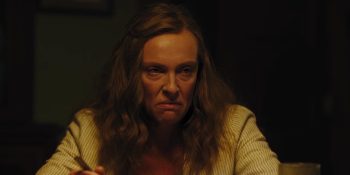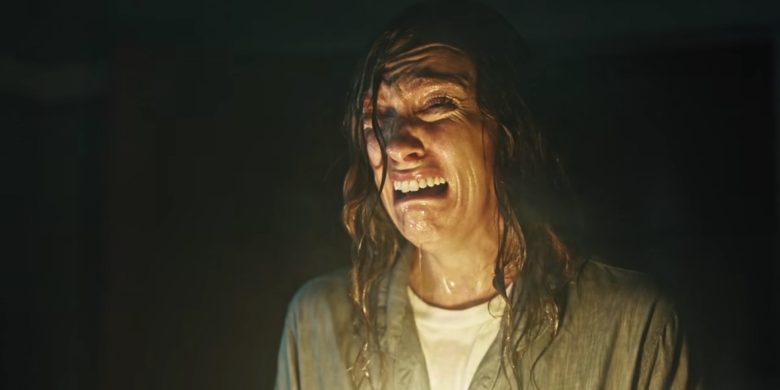Hereditary Review
by Jack Healy
Hereditary is no zombie outbreak or slasher flick. It’s not a popcorn movie because trust me, you’ll lose your appetite right around the 30 minute mark. It’s more Rosemary’s Baby than it is Texas Chainsaw Massacre, more Act 1 of The Exorcist than Act 3. Its scares sit in the back of your mind more often than at the front. But this is one gut-puncher of a film and downright terrifying in its own way.
As the title suggests, Hereditary is about a family. It kicks off with the death of the Grandmother, Ellen (played by Kathleen Chalfant), and then we follow her surviving family navigate the fallout from the loss. The main players are Annie and Steve Graham (the daughter and son-in-law of the deceased, played respectively by Toni Collette and Gabriel Byrne), and their kids Peter (Alex Wolff) and Charlie (Milly Shapiro). This isn’t a perfect family, but their imperfections are relatable. Each person occupies their own headspace and has unique relationships with one another, some better than others.
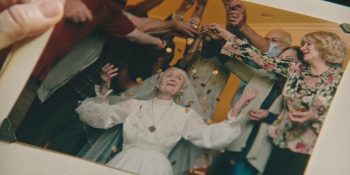
The Graham’s aren’t particularly close. Peter and Annie avoid eye contact and sigh their way through a simple conversation about his evening plans. Steve asks Peter if he’s sad about his grandmother’s passing, followed by the two sharing an understanding grin and chuckle (clearly neither of the men in the family had a great relationship with Ellen). Charlie is in her own world, so introverted that she communicates primarily with a non-verbal clicking sound. Already the film begins to tug on subtle psychological strings by presenting us with the complex and uncomfortable depths of family dynamics.
But there is more darkness to this family than some awkward conversations. Annie speaks up at a bereavement support meeting and casually spills to the circle of strangers that her mother had dissociative identity disorder, her father starved himself to death in the midst of his psychotic depression, and her schizophrenic brother committed suicide in Ellen’s bedroom after claiming she was “putting people inside him.” The film moves on from this as casually as Annie brought it up, but… wow.
Later Annie offers another interesting nugget to her new confidant, Joan (played hauntingly by Ann Dowd). She tells her that years prior, while sleepwalking she doused both Peter and Charlie in gasoline and struck a match (which thankfully woke her up so she could not go any further). Something so upsetting to the kids that it permanently changed each of their relationships with her (duh). It starts becoming clear that darkness and misfortune has been following this family around for years in the shape of mental illness, suicide, and even near homicides. Putting it simply, this family feels cursed.
Well this is all quite the setup, but as soon as things start settling in, the film hits us with a serious curveball (I won’t spoil the details for anyone who has yet to see it). It’s a traumatic experience for the characters and audience alike. It’s like the floor just gives way, sending everyone into a state of shock, sadness, and disgust.
From this point on, the film ratchets up an unshakable sense of dread. The main characters start to crack under the pressure. What once were civil (if a bit awkward) dinner conversations become full blown finger-pointing screaming matches. Peter drifts further away from his friends at school and eventually has a completely terrifying outburst in the middle of class, frightening even his teacher.
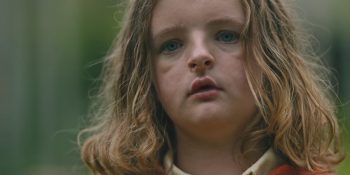
While Hereditary doesn’t have a boogeyman in the traditional sense, you could argue that role is filled by the strangers who smile and wave to us from across the street, or sit in the field outside the Graham’s home performing rituals. There is nothing as overt as a blood-drenched cultist chanting in tongues, but the film does feature multiple unsettlingly grounded seances. There are unfamiliar words scrawled on walls, satanic iconography on jewelry, welcome mats, and a particularly significant lamppost. Hereditary’s main characters are constantly surrounded by imagery like this. The evil atmosphere oppresses them from all angles.
Hereditary is a good versus evil story, yet you begin to realize that there is no good to be found anywhere. There is no guardian angel to help save these characters from the horrors in which they find themselves trapped. There is no light at the end of the tunnel. It doesn’t feel like there is an end to the tunnel at all. Meanwhile the overwhelming presence of evil cannot be escaped.
We watch the main characters become reduced to play things in a larger scheme. It comes into question whether they ever had any agency to begin with. The use of voyeuristic tableau-style framing and the recurrence of dollhouse imagery turns these people into toys. There is a strong sense that they’re being controlled (or at least observed) at all times. The large number of “coincidences” throughout the story start to feel less and less honest as the film goes on. We see adults break down and cry like children – their dignity all but evaporated. They don’t understand why any of this is happening and they’re powerless to stop it.
The cinematography needs to be mentioned, because with pinpoint accuracy, Ari Aster (the film’s Director) and his longtime Cinematographer, Pawel Pogorzelski, present us with some highly unsettling shots to upend any bit of comfort we might have found within the flow of the scenes. There’s the upside down camera angle from the hallway ceiling of Joan’s apartment as Annie storms in looking for answers. This is disorienting and almost feels out of place. Things quickly move on and the meaning of it is never made perfectly clear. But I like to think of this shot as a brief POV angle from King Paimon himself – without spoiling anything, I’ll just say that ceilings come into play later on!
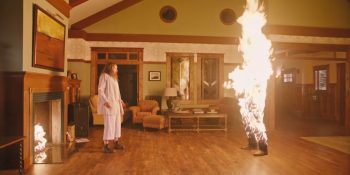
Another moment I can’t leave out is the high velocity pan to the earlier-mentioned lamppost. The camera begins by following Peter’s car, but comes to an abrupt stop as the car passes by the post (revealing that Paimon’s insignia had been left on it). It’s hard to describe how bizarre and jarring this shot is without experiencing it for yourself, but it certainly has lasting impact and proves to be great foreshadowing for a crucial moment that follows.
In fact this whole film is a bit hard to describe. In it, Aster explores subtleties of the human psyche. He highlights the feeling of hopelessness that comes with an unbroken string of misfortunes. He reminds us that while shared tragedies can bring loved ones closer together, sometimes they don’t. Sometimes they push people further away from one another and towards collapse instead.
In its lightest moments, Hereditary is uncomfortable and morose, in its heaviest moments it reaches levels of pure nightmare-fuel terror. It never lets up on its characters or audience – one traumatic event is followed up by another, and then another, messing with our heads and our hearts in perfectly timed integrals.
By the end we’re left with the feeling that the Grahams never stood a chance. The evil forces were at work on this family long before they could sense them. This is a story about generational curse and provides us with the unrelenting dread and futility fitting of that premise. It is a brilliant and thrilling horror film filled with setups, payoffs, twists, and psychological trickery. It’s a slow burner, but that ember erupts into a house fire.
by Jack Healy
